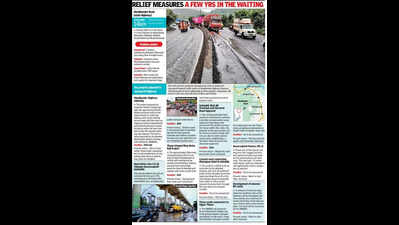ARTICLE AD BOX

T he vital Ghodbunder Highway, a strategic east-west connector located at the farthest end of Mumbai which facilitates movement between the metropolis, Thane, Gujarat, JNPT, and North Maharashtra, has now become a symbol of failed urban and transport planning and bureaucratic apathy.
This has forced lakhs of daily users to endure relentless traffic snarls and delays. So much so that some are even forced to consider relocating elsewhere.Experts say the primary problem with Ghodbunder Highway is that the corporation planners failed to consider constructing alternate routes for city traffic while approving scores of residential complexes in the region. As a result, thousands of city motorists end up fighting for space with outbound traffic, causing it to become one of the most congested corridors in the Metropolitan Region. What worsens the situation is the inconvenience caused by delayed flyover, metro, and highway widening projects; narrowed lanes; and potholes on a major portion, especially the Gaimukh ghat section, which often leads commuters to spend hours at a stretch to even cross small distances. Several crores spent by agencies on upgrades haven't helped either.
Poll
Do you support the temporary relief measure of restricting heavy freight traffic on Ghodbunder Highway?
Yes, it's a good moveNo, it won't help
Marathi actor Milind Phatak, who travels to a studio in Owale, recently took to social media to share his experience of travelling on the highway.
"Often, I end up travelling via Powai and end up paying more simply to avoid getting stuck on Ghodbunder Highway during shoots," he said. Fellow actor Astaad Kale also shared a similar ordeal on social media and questioned how the roads in Thane, despite the city having two heavyweight ministers, continued to suffer.
The frustration of motorists who endure hours crossing the congested and pockmarked stretches of the highway has led some to contemplate relocating elsewhere instead of wasting hours daily in travel.
Sagar Dani, a Kasarwadavli resident and senior official with a departmental store chain who travels to Malad daily, says: "I often spend nearly five to six hours travelling to and from work. This eats into my family time which cannot be compensated.
I migrated from Mumbai thinking of better prospects, but these unnecessary travel delays exhaust me and make me consider plans to return to Mumbai." The impact is also severe for schoolchildren and emergency services like ambulances, as experts fear the continuing jams could someday prove to be potentially life-threatening.
Girish Patil, a regular commuter, along with a few residents, staged a protest last week and recently met deputy chief minister Eknath Shinde over the issue. Public and inter-state transport, too, bear the brunt, as operators report heavy revenue losses due to prolonged delays. "Each bus loses at least two trips per day because of traffic bottlenecks," said a senior official from the Thane municipal transport undertaking.
Transporters, already burdened by steep tolls and restrictions, lament how it takes over two days to transport goods between Bhiwandi and Mumbai, which earlier took 10 to 12 hours," said transporter Abhishek Gupta.
"The roads in Thane and Ghodbunder don't justify the taxes we pay. We are bearing operational losses due to the arbitrary restrictions, which is surprisingly classified as a highway." Meanwhile, Shinde on Monday said he was aware of the inconvenience faced by motorists and accordingly announced temporary relief by restricting heavy freight traffic movement between 6am and midnight on the highway. Experts, however, questioned how it will help, considering the curb was only for trucks with 10 tyres and more. Thane collector Shrikrishna Panchal said they have aranged to restrict all heavy vehicles and will analyse the situation.



.png)
.png)
.png)
















 1 hour ago
3
1 hour ago
3









 English (US) ·
English (US) ·